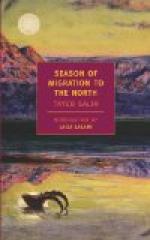A sad procession, we make the boats, and drop downstream toward McMurray. The night is beautiful. The sun sank in a crimson splendour an hour ago. A low-hung moon comes out and is visible and is hidden alternately as we pass on the shore-line high hill and intervening swale. With a blanket thrown over me, as the others sleep, I lie along the gunwale, and the beauty of it sinks into my very soul. Just before we enter McMurray the wraith of a tall oil-derrick tells of the enterprise of some pioneer in the wilderness.
The location of Fort McMurray is ideal. At this point the river breaks into two branches which encircle a high-banked and thickly-wooded island. Some hundreds of yards farther on the Clearwater River makes in; so here we have three streams. The fort has a foundation dating back forty years. This fur outpost will be the terminus of the Alberta and Great Waterways Railway, and one could not well imagine a more beautiful site for a great city. On the broad flat as we enter appear a handful of Indian houses and the little stores of the fur-traders.
Letters from the outside are not as eagerly looked for as one would expect. To the people who live within the North, the North is their world, and to them the news of who is to be appointed to the charge of the next post down the river is of more, importance than the partition of Turkey or a possible redistribution of the thrones of Europe. Mr. Brabant says, “Oh, by the way, Bob, there is a package of letters for you somewhere in the scow. Shall I dig them out for you?” “Never mind,” says Bob, “I’ll get them to-morrow. Have you got any whiskey?”
It is Sunday the fourteenth of June. On the long beach is strewn the water-soaked cargo of the wrecked scow, the abomination of desolation. Mrs. Harding, although all of her personal belongings and her “special orders” are ruined, smiles bravely. It is a point of honour in the North not to whine, whatever happens. All day we work trying to save some of the wrecked cargo. Bales of goods are unwound and stretched out for hundreds of yards in the sun. Bandanna handkerchiefs flutter on bushes. Toilet soap, boots, and bear-traps are at our feet. The Fire-Ranger of the district, Mr. Biggs, has his barley and rice spread out on sheeting, and, turning it over, says bravely, “I think it will dry.” Mathematical and astronomical instruments consigned to a scientist on the Arctic edge are shaken off centre and already have begun to rust, and there are miles and miles of cordage and nets, with braids and sewing silks and Hudson’s Bay blankets!




